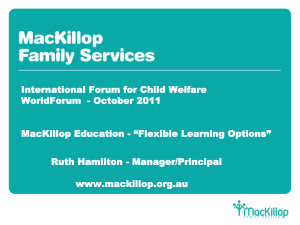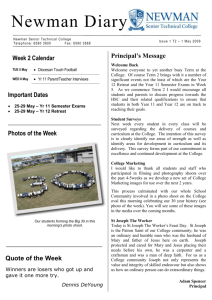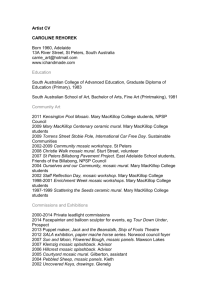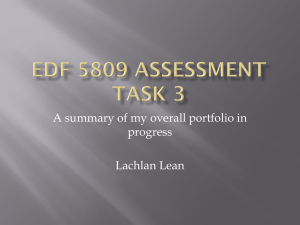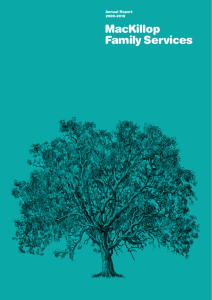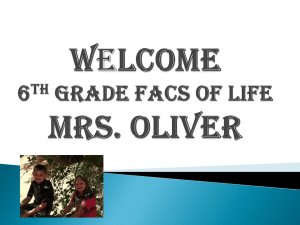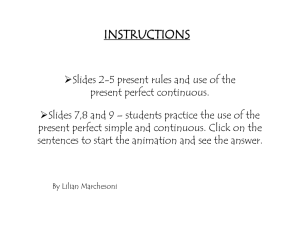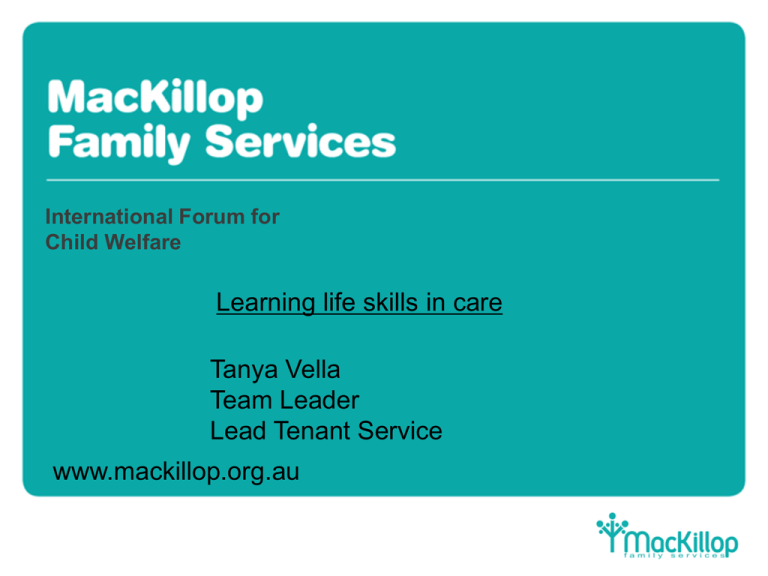
International Forum for
Child Welfare
Learning life skills in care
Tanya Vella
Team Leader
Lead Tenant Service
www.mackillop.org.au
Learning life skills in care
MacKillop Family Services:
Formed in 1997 - Sisters of Mercy, Christian Brothers, Sisters of St Joseph
Leading provider of services for children, young people families
Melbourne, Geelong, Western Sydney and Wollongong
Provided of Home Based and Residential Care, Disability services,
Refugee services, Education and Training
Support to women and men who, as children, were in the care of our
founding agencies
Learning life skills in care
Child ,Youth and Families Division of the Department of Human Services, data estimates
approximately 400 young people between the ages of 16 and 18 years exit their Custody to
Secretary Order or Guardianship Order for the last time in any one year (DHS 2009).
Just sit back for a minute, close your eyes and visualize yourself as a
child completing chores around the house. What were you doing? How
old were you? Who was supporting you with the task?
Learning life skills in care
•
Encouraging and supporting the development of a child or young person’s independent
living skills is critical
•
This commences on the day that they enter into our care
•
Various levels of support depending on individual child or young person
•
Stein (2004): young people in out of home care have to cope with the additional challenges
of major changes in their early lives in a far shorter time than other young people.
•
Young people transitioning from out of home care have compressed and accelerated
transitions to adulthood
Learning life skills in care
•
What is known is that young people exiting state care have been represented in
the groups of the most disadvantaged in the community, especially in the
group of chronic homeless.
Learning life skills in care
•
2009 survey of 471 young people aged 15 to 25 years in care or who had left
care conducted by the CREATE Foundation
•
•
•
•
•
64 percent did not have a leaving care plan;
35 percent were homeless in the first year of leaving care;
46 percent of boys were involved in the juvenile justice system;
35 percent completed Year 12
29 percent were unemployed (compared to the national average which is
9.7 percent); and
28 percent were already parents themselves. (FaHCSIA)
•
Learning life skills in care
•
MacKillop has adopted a range of innovative approaches to support young
people in their preparation for leaving care:
•
•
•
•
•
•
Lead tenant housing model
Cluster housing model
The “Way Out There” living skills training program
MacKillop Kitchen Rules
Learn Right, Drive Right
Transition Plan Templates
Learning life skills in care
•
Lead tenant housing model
•
•
•
•
•
Supporting 16 to 18 year olds experience of semi-independent living
Provide a safe, stable, caring and supportive living environment
Opportunity to practice independent living in a shared household
Assist with transition to independent living arrangements
Live in volunteers who act as positive role models and mentors
Learning life skills in care
Cluster housing model
In September 2010, MacKillop were successful with a tender to run the Cluster
Demonstration model within the Southern region of Melbourne and also Barwon.
Learning life skills in care
The “Way Out There” living skills training program
•This program provides support and training to young people aged from 15 years
and above living in all of our out of home care services in developing the skills
needed when exiting care.
•It covers training and other activities covering drug and alcohol awareness, rental
property management, budgeting, household maintenance skills, first aid, safe
driving and car maintenance , safe sex and cybersafety.
•As part of the program young people receive items such as Melways, first aid
kits, fully stocked tool kit and L plates.
Learning life skills in care
MacKillop Kitchen Rules
•
•
•
•
MacKillop Kitchen Rules promotes positive change and bringing together a
community through food,
In addition to teaching young people in care independent living skills and team
work skills.
MacKillop Kitchen Rules is a competition that young people from five
residential units participated in.
Young people were encouraged to create a menu, a theme for the night and a
three course meal. The teams were encouraged to be as creative as they
wanted, and with that flexibility came some amazing results.
Learning life skills in care
Learn Right, Drive Right
MacKillop’s Barwon region has recently launched the Learn Right, Drive Right
Program.
•The program, which will provide young people preparing to leave MacKillop’s care
with the driving skills they need to be safe on the road
•Generous support from the Honda Foundation with the donation of a car
In addition, MacKillop Family Services has an vehicle use policy which is inclusive
of young people’s needs who are learning to drive.
•This policy gives young people an opportunity to drive a MacKillop vehicle
provided that they have had three professional driving
Learning life skills in care
Transition Plan Templates
•Transition Plan templates have been developed by MacKillop to ensure
that young people that formally leave care are adequately prepared and
can care for themselves upon leaving care.
•Transition planning is the cornerstone of ensuring that young people
have the best opportunity to be as prepared for their transition from care
as possible.
Only 31.7%
of eligible young people report
having a leaving plan.
Create report card 2011
Learning life skills in care
It is evident that preparation for leaving care commences as soon as a
child or young people is placed in our care regardless of whether it is
residential care, lead tenant or foster care.
Each individual needs to be guided with a plan, mentored and
encouraged in order to thrive, given that this is their basic human right. It
is our responsibility as a care system to uphold this right and not
abdicate responsibilities of public parenting.

